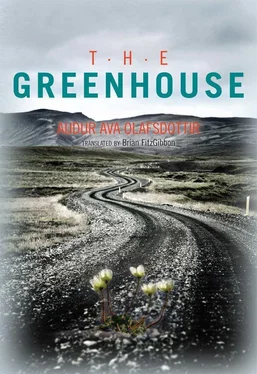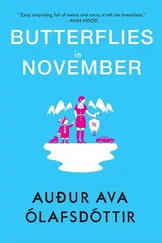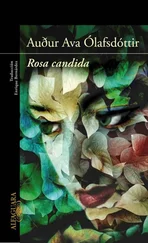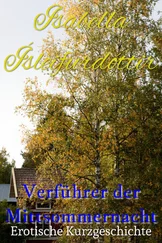
Half an hour later there’s a knock on the door again. I think it might be my neighbor who has come to collect the iron I forgot to return to her yesterday. It’s Anna again.
She wavers in the doorway with her case in her hands.
— I was just thinking, she says, casting her eyes to the floor, that’s if you’ve no objections, of course, she continues as if trying to pave the way for what is about to follow, that I could just as easily finish the thesis here instead of going away. While you’re getting to know each other, it’s better for Flóra Sól as well, I mean, that she gets used to you while I’m here as well. That’s if you’ve got nothing against it, she says, sounding insecure; she’s feeling bad because she doesn’t want to leave.
— Of course, I’d sleep on the sofa in the sitting room, she quickly adds, so you two could have the bedroom. Then she hesitantly steps in and bends over to pick up my daughter, who is playing with a cube, as if to emphasize that the child can’t be without her. She takes a few steps back toward the door with the child, while she’s waiting for my response and also because, formally speaking, I haven’t invited her back in yet. Strictly speaking, she has already handed the child over to me. My daughter looks at her mother full of understanding, and I sense she’s showing her solidarity; they’re both staring at me from the door, the mother and daughter, waiting for my reaction.
— I could also stay in the guesthouse, she says, looking straight at the floor. She has a beautiful throat and neck.
— In any case I’d be at the library during the day.
Because I can see how bad she’s feeling, the only thing that occurs to me is to put her mind at rest and gently touch her arm. Then I say:
— You can stay here, and there’s a slight tremor in my voice.
I’ve just splattered it out without thinking about how quickly my life is changing.
— Thank you so much, she says softly. So long as you’re sure it’s OK. She’s so clearly relieved, she almost looks happy.
First I offer her my bed and sleep on the sofa for one night, now I’ve just invited her to live with me and write her thesis. I should probably be asking myself what I just got myself into. What does it mean? That she is going to live with the child and me and teach me the ropes? And yet, deep inside, in some strange and indefinable way, I’m delighted.
— Would you like to just start on your thesis then while I take Flóra Sól out in the carriage? I say. You two can have the bedroom, I’ll take the sofa, I add.
She grabs her case and takes it straight into the room. Then she reemerges with a thick book under her arm, sits down at the kitchen table, flicks through some chapters in the middle of the book, and starts reading her genetics.

I suffered from earaches as a child, so I fasten the blue bonnet with the lace brim around my daughter before taking her out, ensuring, however, that her two curly locks remain visible. Then I set off with the child on a tour around the village. There is no denying that the baby carriage and I attract plenty of attention; the reception I get from the villagers is very different and a lot warmer when I’m with the child than when I’m on my own. I also notice something I’d never really thought about before, and that is that there are no children wandering around this place; I’m the only person with a small child in the village this morning.
I prop up my daughter so she can look back at the pedestrians who are watching her. She attracts both admiration and interest on our first trip down to the bottom of the main street. The women seem to give me more attention in my first fifteen minutes with the baby carriage than they have in the entire approximately two months I’ve been here alone in the village. Women’s emotional lives seem pretty complex to me, and their reactions are often unpredictable. When I’ve finished pushing the carriage four times up and down the village street, I have the idea of taking my daughter into the church to show her the altarpiece with the baby Jesus that resembles her.
The uneven stonework on the floor causes the carriage to totter, so I leave it inside the church’s entrance under a painting of doomsday and take the pacifier with me. Still, I don’t expect anyone to object to the child being in the church, even if there is a mass going on. There are just a few old women on the benches. I don’t walk straight to the picture with the child, but sit at the back to give my daughter a chance to acclimatize herself to the semidarkness. Then we gradually make our way toward the chancel at the front of the church and I show her the first paintings, one after another, reading out the inscriptions for her. We take our time with each painting; the child is interested and agile in my arms. We look at Mary Magdalene with her long red hair; then I halt when we get to Saint Joseph. The painting shows a careworn old man with drooping shoulders, weighed down by life’s burdens. I put some coins in the box and light a candle. The inscription says that Saint Joseph was a loyal husband, as well as a devout and hardworking man. He was a foster father, I think to myself, and took on the responsibilities he was given. I’m not a foster father the way Joseph was; my daughter has the same kind of earlobes I have and a birthmark in the same spot of the groin. She’s the flesh of my flesh, if I can put it in theological terms. Nevertheless I feel some sympathy for Saint Joseph; he must have felt lonely in bed.
— My brother Joseph, I say jokingly. Then I remember the postcard I was going to send to Jósef because he likes to collect stamps.
— It’s a boy, I say when we reach Mary on the throne with her child. My daughter stops wriggling in my arms and becomes incredibly still and serious. She stares wide-eyed at her double with rosy cheeks, dimples, and two yellow curly locks on his forehead. Now that I’m standing here beside the painting with my daughter, I just can’t get over the striking resemblance. Even the ears are the same; I hadn’t noticed the folds in baby Jesus’s ears before. A woman is kneeling in front of the painting and, when she stands up, glances back and forth at my daughter and the painting in wonderment. I know what’s going through her mind.
On our way out I ask the woman who sells plastic saints in a little stall by the entrance for some more information about the painting. She says there are more questions than answers about it. Out of curiosity — and also because she’s sometimes asked — she’s tried to get some information on the piece, from Father Thomas among other people, but without any great results; there is even some uncertainty about who the painter is.
— It is generally believed, though, to be the work of a little-known woman painter, the daughter of a master from a neighboring province who has since been almost forgotten himself, says the woman handing my child a plastic saint to look at. The child pushes her small index finger through the gilded halo.

My main concern right now is shopping for food. I didn’t expect to have to cook more than one dinner for the mother and child and it’s caught me off guard. Even though it hasn’t exactly been said in so many words, I’ve been catapulted into family life with a woman and child sleeping in the next room. This isn’t the result of any premeditated decision on my part, and I’m given no time to prepare myself. From now on I have to shop differently and cater to the needs of three people.
Читать дальше













